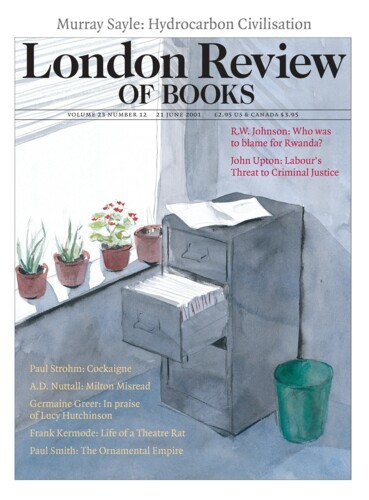Ann Widdecombe should now have time to finish her second novel. It was due for publication this summer, but had to be deferred till next year because of the election campaign. The heroine of An Act of Treachery is to be a convent schoolgirl in Occupied France; she falls in love with a senior German officer who, to give the story real moral complexity, is also married. Il n’y a que le texte? Let’s hope so. Besides joining the current flurry of neither-up-nor-down-market novels that have to do with the Second World War, including Joanne Harris’s Five Quarters of the Orange and A Son of War by Melvyn Bragg, An Act of Treachery follows the success of Widdecombe’s first novel, The Clematis Tree. That tale of a child brain-damaged in a car accident could be said to have something of the night about it. Edwina Currie, whose novels include A Parliamentary Affair and Chasing Men, described The Clematis Tree in the Mail on Sunday as ‘the product of a perceptive but warped mind’; she also complained about its shying away from sex. The title of An Act of Treachery suggests things may be set to change; but we shouldn’t forget the words of St Matthew (the convent schoolgirl wouldn’t): ‘whosoever looketh on a woman’ – or Nazi officer – ‘to lust after’ etc. All will be revealed in January, so long as the leadership of the Tory Party doesn’t get in the way.
The more hilarious sayings of George W. Bush have been collected in The Bush Dyslexicon by Mark Crispin Miller (Bantam, £6.99): ‘the great thing about America is everyone should vote’; ‘more and more of our imports come from overseas.’ In Humour in the White House: The Wit of Five American Presidents (McFarland, £30.40), Arthur Sloane, a professor of management at the University of Delaware, takes a serious look at the jokes made by Lincoln, Coolidge, FDR, JFK and Reagan, and at the way each man’s sense of humour helped him hang onto power. Reagan, we are told, is ‘genial’ and ‘amiable’. When he was Governor of California, he responded to repeated questions of ‘What about Vietnam?’ with: ‘Is there an echo in here?’ The same tactic proved useful in 1982 when members of the West German Bundestag asked: ‘What about El Salvador?’ In his final State of the Union address, Reagan announced: ‘Some years ago, the Federal Government declared war on poverty, and poverty won.’ Amiable?
Britney Spears – will her oldest fan, Alistair Campbell, help her run for President in 2004? – has co-written with her mother a not-in-the-slightest-bit-autobiographical novel about a teenager who becomes a pop star. Some say, however, that A Mother’s Gift (Boxtree, £9.99) was ghostwritten by Tom Carter, a ‘pop biographer’. Now that would be a shock. In 1996, Sophie Marceau, the actress most familiar to English-speaking audiences for her roles in Braveheart and The World Is Not Enough, published a novel, Menteuse. She was encouraged to write it by her husband, the director Andrzej Zulawski, who proceeded to slag it off in the French press. Menteuse has now been translated into English by Adriana Hunter as Telling Lies (Phoenix, £6.99). It begins with the narrator alone in her apartment, describing the departure of her lover, an event entangled in her memory with the smell of warm bread rising from the bakery below. This may remind some readers of the opening of Naissance des fantômes (My Phantom Husband) by Marie Darrieussecq – M.D.’s latest novel, Le Mal de mer, has recently come out in English as Breathing Underwater (Faber, £9.99) – in which the narrator’s husband leaves their apartment to buy a loaf of bread and never returns. There wouldn’t be anything unusual about a first-time novelist, even if she is a film star, being influenced by a writer as prominent as Darrieussecq; but Naissance des fantômes came out two years after Menteuse. Was Menteuse ghostwritten? And if so, by whom? It may just be, of course, that Frenchmen who leave their wives always say they’re off to buy a loaf of bread, the way their anglophone counterparts go out for a packet of fags, and speculation about ‘true authorship’ is fruitless, anyway. Il n’y a, after all, que les textes.
Send Letters To:
The Editor
London Review of Books,
28 Little Russell Street
London, WC1A 2HN
letters@lrb.co.uk
Please include name, address, and a telephone number.

